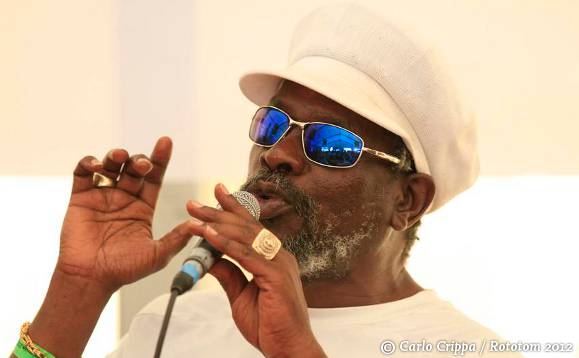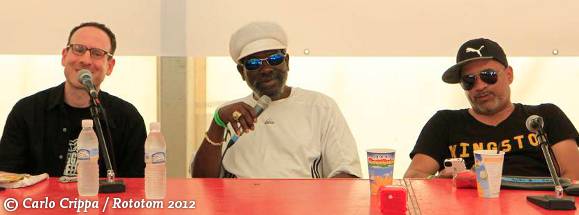Articles about reggae music, reviews, interviews, reports and more...
The Incredible Career of Johnny Osbourne

The Incredible Career of Johnny Osbourne
Johnny Osbourne at Rototom Sunsplash Reggae University.
Tuesday's Reggae University session welcomed two important figures in Jamaican music who both came to prominence around the start of the 1970s – Clive Chin and Johnny Osbourne.
Osbourne, all in white and in blue tinted sunglasses, was joined by his manager Neil Robertson, although he didn't participate in the discussion. As ever, the panel was formed of Ellen Koehlings and Pete Lilly from Riddim magazine, as well as journalists Pier Tosi and David Katz – who led the discussion. The session began fifteen minutes late due to "technical difficulties".

Johnny began singing in church and studied music at Kingston's famous Alpha School for Boys – where his mother sent him because "she was poor she couldn't watch me and work". He learned the trumpet under the great Lenny Hibbert but became discouraged. "He had a weird way of teaching. Every mistake he'd hit you with drumstick. If it wasn't for his drumstick perhaps I wouldn't be a great singer today!"
He remembers Jamaica becoming independent as a very happy festive time. "Lots of world leaders came and there were lots of floats - as a child was like a big circus". But it was US R&B that grabbed the young Errol Osbourne's attention – so much that he changed his name from Errol to Johnny "because I loved Johnny Mathis".
US songwriting inspired him to record his first 45 All I Have Is Love in the mid 60s with the group Wildcats (whose occasional members also included Tinga Stewart). Just 500 copies were pressed but reissues by Sonia Pottinger and then Coxsone Dodd at Studio 1 eventually brought him some fame by the end of the decade. His singing and his songs also brought him to the attention of Winston Wright who got him some studio time with Duke Reid to record the album Come Back Darling with the Sensations – of whom Johnny was keen to stress he was never a full member. By the time the album was released in 1969 Johnny had left Jamaica to migrate to Canada to be with his family – who feared he would get caught up in the burgeoning political violence in West Kingston.
After ten years, performing with Jamaican musicians in Canadian clubs – "sliding reggae in between top forty material like Earth Wind and Fire" – Johnny returned to Jamaica in 1979 for what he called "My second coming". Osbourne had auditioned and been rejected by Studio 1 underlings in the past but according to him "Studio 1 is the Motown of reggae music and Dodd is the Berry Gordy of Jamaica. Until I could get my foot in door there I didn't think I had fulfilled my musical purpose." Coxsone greeted him warmly and gave him some dusty four track tapes of old rhythms to voice which would become his classic album Truths and Rights.
Prompted by Lilly, Osbourne explained the music was a response to the troubled political situation of the time which had got even worse in his absence. However he was keen to stress that "I am not of any political party. I was the people's singer. I could walk through any neighbourhood singing day and night".
In Canada Johnny had made contact with another migrant, Lloyd "Prince Jammy" James and on his return, while working for Dodd, cut the deep roots album Fally Ranking. His voice also caught the attention of Henry Junjo Lawes who asked him to make some music in Lovers Rock style for the people of England – yielding his hits Ice Cream Love and Fally Lover.

Johnny adapted to the mid 80s digital revolution with ease. "My creative ability always challenges me to do creative things. I was in New York when Sleng Teng come out. A friend brought it over. I thought 'Blouse and skirt. What is this?'" The result was the tune Buddy Bye – which he explained actually derived from his request to "put it by number one" because he wanted chart success.
Summarising where he is today the great man said. "I have no regrets where my career is concerned. My voice is like vintage wine it gets better with age". He also described returning to Jamaica in 2012 to perform at Tony Rebel's Rebel Salute festival as "my third coming". Taking questions from the floor he tantalised reggae fans with the knowledge that he had recorded a series of old rhythms with the great Rasta drummer Count Ossie for a second album with Coxsone Dodd but Coxsone had lost the tapes!
Johnny had to leave to make ready for his imminent performance on the main stage. However he had this lesson for anyone trying to follow him in music "when you get gift from the creator - use it properly".
Read more about this topic
Comments actually desactivated due to too much spams
Browse by categories
Recommended Articles
Latest articles
Recently addedView all
© 2007-2026 United Reggae. All Rights Reserved. Reproduction in whole or in part is prohibited. Read about copyright
Terms of use | About us | Contact us | Authors | Newsletter | A-Z














